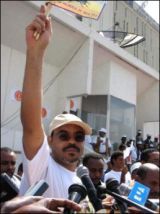Ethiopian ruling party declares election victory
ADDIS ABABA, May 16 (AFP) — Ethiopia’s ruling party said late Monday it had won hotly contested weekend general elections but offered an olive branch to the opposition which made significant gains in the 547-seat parliament.

|
|
Ethiopian Prime Minister Meles Zenawi addresses supporters in Addis Ababa. (AFP). |
While conceding it had lost all of Addis Ababa’s 23 parliamentary seats as well as the capital’s city council, the Ethiopian People’s Revolutionary Front (EPRDF) said it would soon form a new government with a parliamentary majority.
“We have won the necessary seats to form a federal government; we accept the verdict of the people,” Prime Minister Meles Zenawi’s party said in a statement, adding that it would work in good faith with the opposition.
“As we have been calling on the opposition to accept the verdict of the people, we at the EPRDF have accepted the decision of the people where we have lost,” it said.
“We will remain committed to work as usual in areas where we have lost with those who won,” the statement said, adding that the party had also taken four of eight regional assemblies: South Ethiopia Peoples, Oromia, Amhara and Tigray.
It gave no indication of how many parliamentary seats the EPRDF had won in Sunday’s election but it had previously held 481 posts and the state-run Ethiopian News Agency reported that it had been a “landslide victory.”
The statement was released after Ethiopia’s two main opposition groups, which had only a handful of MPs, said they had won as many as 61 parliamentary seats, including at least 20 in Addis Ababa.
The election was the vast, impoverished Horn of Africa country’s third since the 1991 fall of a Soviet-backed dictatorship, second since the advent of multi-party politics and first under international scrutiny.
Official preliminary returns are not due until Saturday and final results not until June, but the EPRDF conceded it had been shut out in all contests in the capital where Meles has banned all demonstrations for the next month.
The announcement came as preliminary vote counts from the more than 30,000 individual polling stations trickled with the opposition claiming big wins and dropping earlier threats to boycott the results.
The two opposition groups, the Coalition for Unity and Democracy (CUD) and the United Ethiopian Democratic Forces (UEDF), had set a target of winning 185 parliamentary seats together, enough to block legislation.
It was not clear whether they had had come close to reaching that goal but by winning the 23 Addis Ababa seats, the CUD passed the threshold of 20 needed to proposed bills.
One Western Addis Ababa-based diplomat called the CUD’s success in the capital “an unheard of mini-revolution for the opposition” and questioned whether Meles would be able accept larger losses.
Despite the opposition’s excitement, observers said the EPRDF had been in no danger of losing its bid for a third term due to strong support in rural areas where 85 percent of the population lives.
And the conciliatory tone of the EPRDF statement was a signal the party, which allowed unprecedented media access to the opposition during the campaign, wants warm ties with donors who pay 40 percent of the nation’s annual budget.
Earlier Monday, the national election board pronounced the peaceful election a success with more than 90 percent turnout from the country’s 26 million registered voters and only minor logistical problems.
In addition, international poll monitors lauded the conduct of the election, questioned some opposition complaints and former US president Jimmy Carter brushed aside Meles’ ban on demonstrations in the capital.
Carter, who led a team of 50 observers, said he was satisfied with the explanation for the ban given to him by the prime minister who he said was concerned that opposition success in the capital might spark violence.
He said the “very narrowly defined directive” was “not excessive” but allowed that others might differ as he lauded the conduct of the election.
“My impression is … that the reported irregularities did not impede the overall ability or individual ability of voters to express their view,” Carter said.
